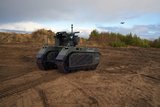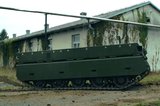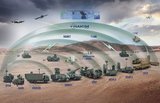US Army tests cluster-bomb round replacement
A new artillery warhead is being tested by the US Army in an effort to help reduce unwanted casualties caused by cluster-bomb rounds.
Current dual-purpose improved conventional munitions rounds contain hundreds of small cluster bombs that can leave 'duds' unexploded on the battlefield, posing a danger to civilians.
A new M30A1 guided multiple launch rocket system alternate warhead was recently tested in fire exercises at Udairi Training Range in Kuwait. The new round is being implemented to limit duds by replacing the smaller explosives with 180,000 tungsten steel bee-bee-sized balls.
The round, which is effective against light skinned vehicles and personnel, is expected to have applications in antiterrorism operations.
Unlike high explosive rounds that produce large localised explosions and large pieces of shrapnel, the new small pellet round covers a much larger area.
More from Land Warfare
-
![Estonia builds Asia-Pacific links as it looks to scale defence industry capabilities]()
Estonia builds Asia-Pacific links as it looks to scale defence industry capabilities
Collaboration between Estonian defence companies and well-aligned firms in Asia-Pacific will form a key part of Tallinn’s ambitions to significantly grow its defence industrial base.
-
![World Defense Show 2026: DOK-ING working on MV-8 variants and reveals specs ahead of Eurosatory]()
World Defense Show 2026: DOK-ING working on MV-8 variants and reveals specs ahead of Eurosatory
The Croatian company began the development of the MV-8 modular uncrewed platform in the early 2020s. Specifications for the vehicle were revealed to Shephard at World Defense Show 2026.
-
![World Defense Show 2026: Turkish and European industries will cooperate, says Aselsan boss]()
World Defense Show 2026: Turkish and European industries will cooperate, says Aselsan boss
Aselsan was formed 50 years ago in response to difficulties Turkey was facing in sourcing major systems internationally. While some challenges still remain, company president Ahmet Akyol believes a rapprochement is possible.
-
![World Defense Show 2026: MARSS displays new Nation Shield air defence C2 system]()
World Defense Show 2026: MARSS displays new Nation Shield air defence C2 system
Nation Shield is the latest iteration of the MARSS C2 system and is designed to provide C2 further forward along with more capable air defence.
-
![World Defense Show 2026: Middle East remains focused on US equipment and local industry involvement]()
World Defense Show 2026: Middle East remains focused on US equipment and local industry involvement
Vehicle procurement in the Middle East continues to target big-ticket main battle tanks, with lighter platform purchases also potentially on the horizon including tactical, infantry fighting and armoured personnel carrier vehicles.





















